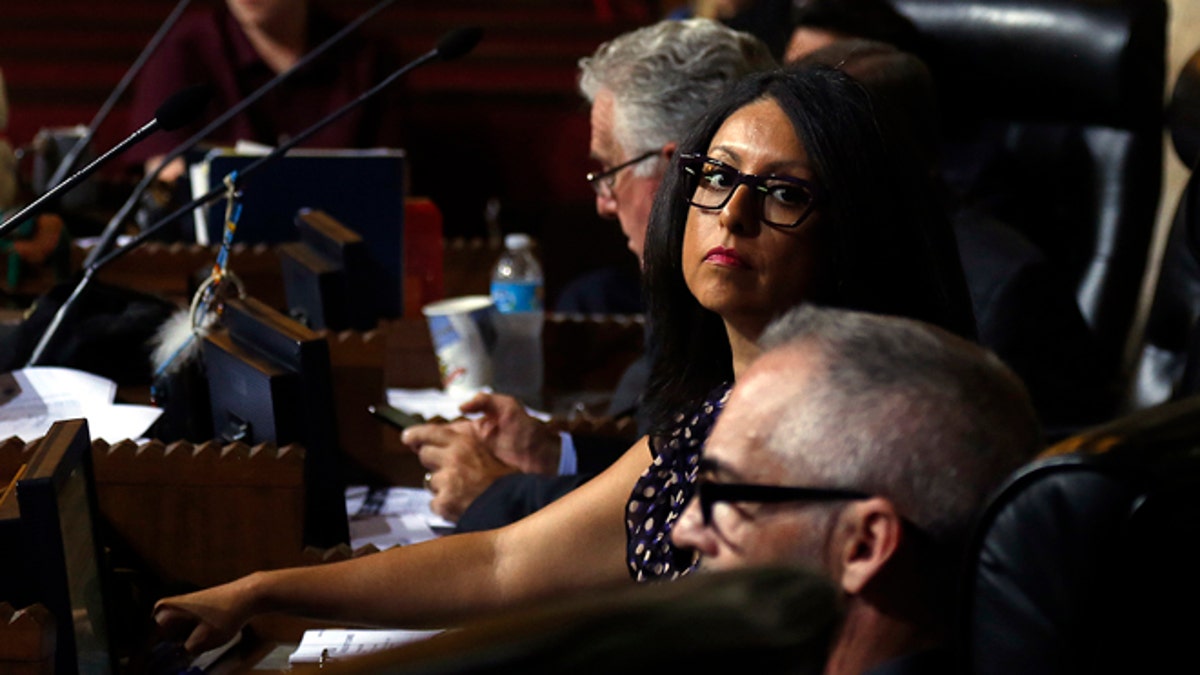
Council member Nury Martinez and the rest of the Los Angeles City Council discuss and vote to approve the permit process that would allow Uber and Lyft to apply to gain access to Los Angeles International Airport for picking up fares. ( Rick Loomis / Los Angeles Times via Getty Images ) (Los Angeles Times)
A Los Angeles City councilwoman is under federal investigation in a campaign-finance probe that is focusing on not on big-dollar donations, but on filings worth $5 to $10.
Five constituents in Councilwoman Nury Martinez's San Fernando Valley district were contacted by the FBI and appeared before a federal grand jury over their purported campaign contributions.
One of them, Irene Salazar of Sun Valley, said she did not provide any money to Martinez’s 2015 reelection bid even though the city’s Ethics Commission lists Salazar, her husband, her son and her daughter as being $5 donors.
"None of us gave anything" to the Martinez campaign, Salazar told the Los Angeles Times.
It is unclear what federal investigators are looking into and who is being targeted, but Roy Behr, a consultant on the councilwoman's reelection campaign, said in October that Martinez "understands from the U.S. attorney" that she is not a target.
- Best pix of the week
- Unstoppable California wildfire reaches almost 100 sq. miles
- Flash floods in Southern California leave hundreds of drivers stranded
- Love that lasts forever: California couple celebrates 82 years of marriage
- Divided families the legacy of surge in Cuban immigration to U.S.
- Despite transparency, Latinos urge tech companies to step up diversity efforts
- Ellis Island Museum to update story of immigration
"As far as she knows, that is still accurate," Behr told the Times.
Both the FBI and the U.S. Attorney's Office declined to comment on the investigation.
Small scale donations are important to the campaigns of many local politicians like Martinez who use the money to qualify for much larger pool of matching funds, which is taxpayer money allotted to candidates who show grassroots support.
Newly-approved regulations made the 2015 city council election in Los Angeles the first for which candidates had to submit a list of at least 200 residents of their district who contributed to their campaign in order to qualify for matching funds. If a candidate qualifies for the funds, they receive up to $2 from the city's coffers for every dollar they got from a campaign donor residing in Los Angeles.
Martinez submitted that she received donations from residents in the neighborhoods of Panorama City, Lake Balboa and Van Nuys – which led to her campaign getting $65,360 in public funds – or about one-fifth of her total campaign spending.
Another resident in Martinez’s district who was contacted by the FBI, Gary Villagonzalo, said that he had no idea he had donated $10 to the Martinez campaign until told by the federal law enforcement agency. Villagonzalo later found out that his college-aged daughter donated the money and named him, his wife and his other daughter as co-donors.
"She just put our names there – 10 bucks, 10 bucks, 10 bucks," Villagonzalo said. "We're really upset."
The Los Angeles City Charter does not allow residents to donate to campaigns on behalf of another person without their knowledge. Each violation can be treated as a misdemeanor with a resulting $5,000 financial penalty.
According to the Times, some of the people questioned by the FBI did donate to the Martinez campaign.
The new ethics laws stirred up controversy during last year’s election season, with some candidates complaining that it was difficult for residents in working-class and lower income districts to donate.
"It was a really hard, very time-consuming, process," former state assemblywoman Cindy Montañez, who ran against Martinez, told the L.A. Times. "Because [donors] have to live in the council district, and people in our council district are not used to giving money."




